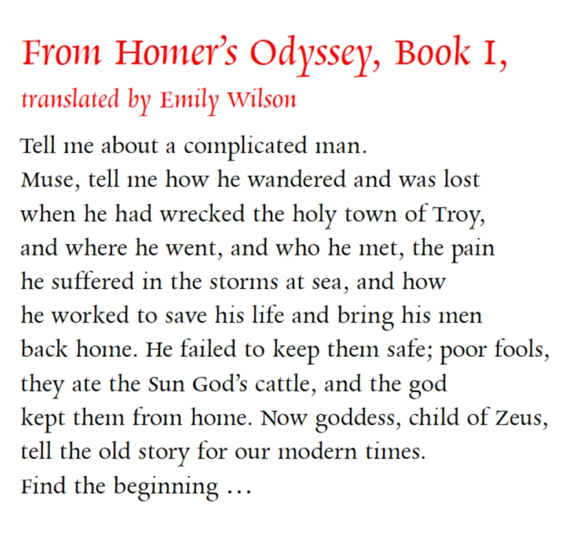
My wife thinks I write too much about the past. She’s concerned that it dates me and worries that readers will think I’m old and out of touch. I agree with her that it’s important to live in the present, messy as that present is, but the past gives us context and offers us lessons for the present.
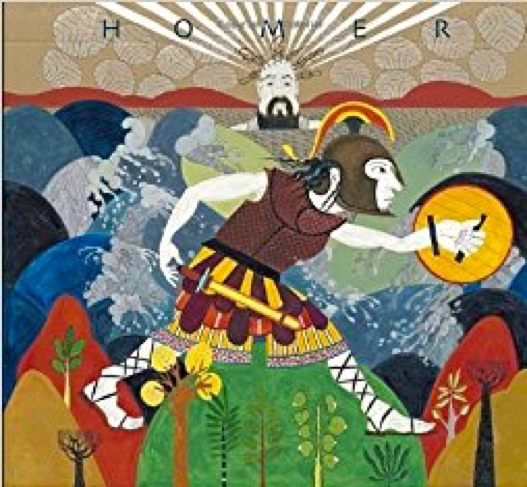
In times of stress I often find solace in books, and last week’s news cycle drove me into a new translation of The Odyssey. I’ve tried it before; in 1996 I listened to Robert Fagels’ version on tape but couldn’t finish it. The new translation by Emily Wilson is a fluid retelling of the saga that breathes a contemporary feel into the ancient story without damaging its classical roots. It’s full of brave warriors, damsels in distress, dangerous ogres, duplicitous enemies, faithless gods, raging storms and at its center an action hero working his way home from the Trojan War. I was immediately sucked in.
The poem’s provenance is as mythical as its subject. Originally, it was in the oral tradition, a tale told around a fire, and it must have been incredible to experience that way. In the 7th or 8th century BC the first written version was made, and it’s been at the center of classical literature ever since. I could get lost in it and let it consume my remaining 8 years and 7 months on earth (see my previous blog for details). It’s worthy of that kind of study.
But, don’t leave me now; we’re going back to the present shortly with Odysseus’ epic tale as a touchstone to the present. Odysseus, the action hero, is a flawed character who uses the cards he’s been dealt to overcome obstacles and guide his journey home. He and his faithful, long suffering wife, Penelope, remind us that life is difficult and packed with unpredictable twists and turns, but guided by ideals and goals they triumph in the end. In the age of Trump, we are desperate for a hero, someone whose courage, honesty, and example encourage us to persevere and find the right course to the future.
When I was growing up there were plenty of heroes – famous and not so famous – Eisenhower and the Allied troops at Normandy, John Kennedy and PT109, Ted Williams batting .406 and flying fighters in the Pacific, Chuck Yeager, Gloria Steinem, John Glenn and the Mercury astronauts, Jacques Cousteau, Jonas Salk, Joseph Welch, Golda Meir, Jackie Kennedy, Joan Baez, and Bob Dylan. These soldiers, politicians, sportsmen, scientists and artists were people we looked up to and tried to emulate.
There are still heroes in our midst, but this is not the same world we lived in 50 short years ago. There are no military victories to celebrate. We live in an uncertain world that can be destabilized by the actions of individuals (9/11), where state actors anonymously interfere in the affairs of other states through cyberwarfare (Russian interference in the US election), and our own President, the antithesis of a hero, is immoral, venal, and narcissistic.
Still, in spite of Donald Trump and the shaky state of world politics, I remain a long term optimist. There are men and women with heroic qualities, admirable people who are models of rectitude. They come from all countries, disciplines, and backgrounds – Malala Yousefzai the young Pakistani girl fighting for the rights of young women to an education, George and Amal Clooney working to end the civil war in South Sudan, Jimmy and Rosalynn Carter’s efforts for Habitat for Humanity, Angela Merkel giving safe haven to refugees in Germany, Christine Lagarde’s leading the IMF, and at a time when many of our sports heroes have been shown to have feet of clay, Roger Federer’s continuing superiority in the world of tennis. These individuals command our respect for their excellence, sportsmanship, and character.
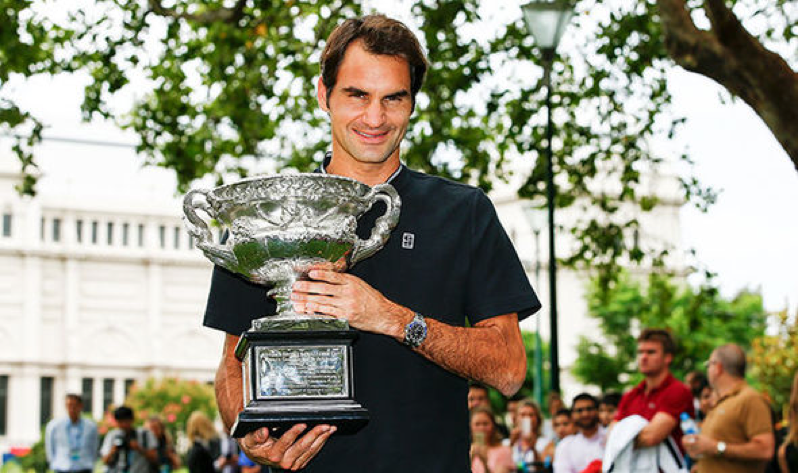
Is it hyperbolic to single out a tennis champion as a hero when politicians are seriously discussing the use of nuclear weapons and the end of the world as we know it? Am I fiddling while Rome burns? On the contrary, I see Roger as almost mythic in stature, someone to emulate, someone whose pursuit of excellence can teach leaders everywhere to be better people. He possesses remarkable physical gifts, but it’s his tireless pursuit of on court excellence and off court life balance that has taken him to the top of his profession and allowed him to remain there. His unforgettable battles with Rafael Nadal are legendary and their rivalry has lifted the sport to a higher level. His passion for the game manifests in helping others and working to improve the sport. He celebrates family, and his wife, Mirka, and two sets of twins go with him wherever he plays. He competes for his country in the Olympics and Davis Cup, and is humble in victory and generous in defeat. The world would be a better place if there were more like him. To me his stature is heroic.
The world is hungry for heroes and heroines. At a time when gridlock is everywhere from our freeways to Congress to the war in Afghanistan it’s normal to look for someone with the character and leadership skills to guide us toward something better. In times of crisis it’s easy to be discouraged. If you stopped reading The Odyssey in the middle you might have imagined a different and darker ending. There were still many more storms and enemies in his path, but he believed in himself and his mission and, in the end, he made it home. I hope that holds true for us as well.
This week, with the White House in chaos and the stock market in freefall, you can be forgiven if you imagine a dark ending. I’m going with Odysseus and the belief that we will weather the storms, ogres, bullies, and bullshit that’s coming at us. We’ll get there; I just hope it’s sooner rather than later and that we have the means to clean up the wreckage when we do.
“Now godess, child of Zeus, tell the old story for our modern times.”






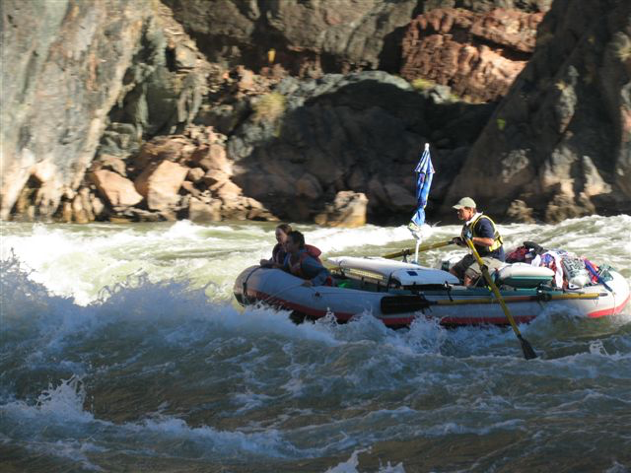
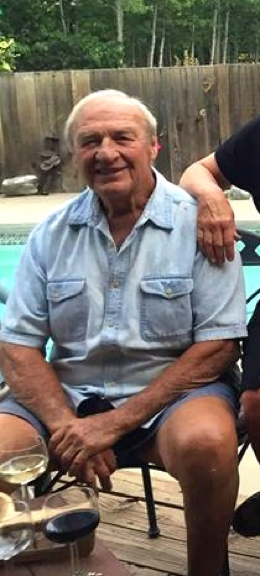 All this was in my mind when I learned that my friend, Joel, suffered a serious stroke while visiting friends on Sanibel Island in Florida. His life will never be the same. In an instant, everything changed – for Joel, for his wife Jody, for his children, grandchildren and friends. The good news is, after being life-flighted to a hospital in Fort Myers and spending time in the ICU, he’s out of the hospital and starting the long path to recovery. As our mutual friend, Annie, says he’s a tough old bird and that bodes well for a good recovery. But, none of us will ever be the same. Each time this happens to a friend it reminds us that we’re closer to the end than the beginning.
All this was in my mind when I learned that my friend, Joel, suffered a serious stroke while visiting friends on Sanibel Island in Florida. His life will never be the same. In an instant, everything changed – for Joel, for his wife Jody, for his children, grandchildren and friends. The good news is, after being life-flighted to a hospital in Fort Myers and spending time in the ICU, he’s out of the hospital and starting the long path to recovery. As our mutual friend, Annie, says he’s a tough old bird and that bodes well for a good recovery. But, none of us will ever be the same. Each time this happens to a friend it reminds us that we’re closer to the end than the beginning.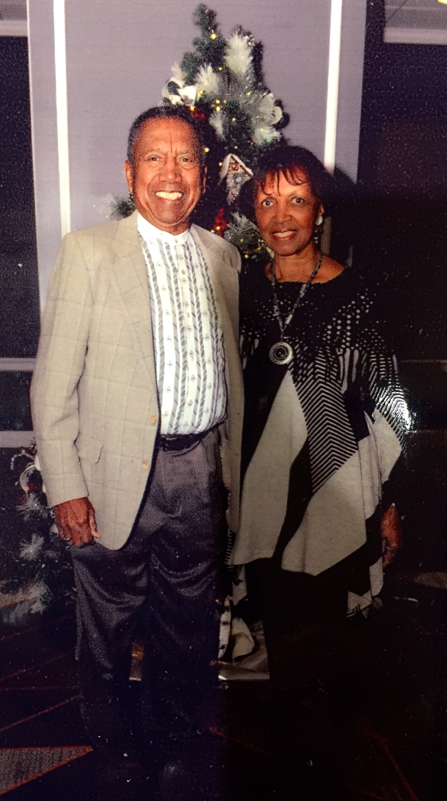
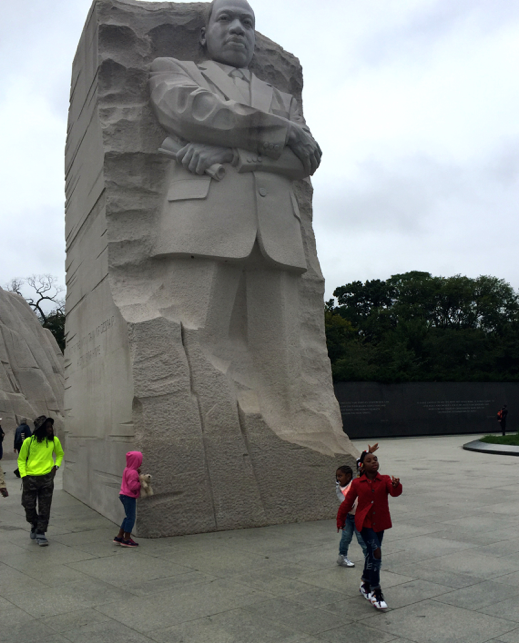
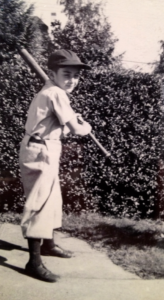 Times were lean for the country, but it wasn’t bad for an 8-year-old kid in Seattle. Isaac I. Stevens Elementary stands at the north end of Capitol Hill, a mixed neighborhood of older upscale, middle and lower income families. Within its boundaries are two Catholic schools, a Congregational Church, and a synagogue – and in 1944 its southern edge was Seattle’s Central Area, a mostly black neighborhood, where the edges were mixed and families lived in harmony while racially restrictive covenants were preventing other black families from buying in the white neighborhoods further north.
Times were lean for the country, but it wasn’t bad for an 8-year-old kid in Seattle. Isaac I. Stevens Elementary stands at the north end of Capitol Hill, a mixed neighborhood of older upscale, middle and lower income families. Within its boundaries are two Catholic schools, a Congregational Church, and a synagogue – and in 1944 its southern edge was Seattle’s Central Area, a mostly black neighborhood, where the edges were mixed and families lived in harmony while racially restrictive covenants were preventing other black families from buying in the white neighborhoods further north.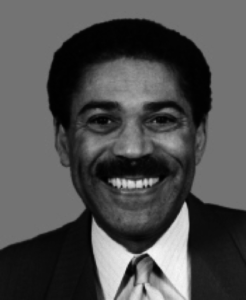 William L. “Bill” Clay (pictured right) who retired from the House of Representatives in 2001 after representing his St. Louis district for 32 years. Not surprisingly, after so many years in Congress, Bill Clay decided to stay in the DC area after retirement. When he read my post about Corky he emailed Ed to say he had a friend living in Maryland who grew up in Seattle and goes by the nickname “Corky” White. A few emails with Bill and a few more directed to “Patsy” White (a shared email address) revealed that Cortez A. White of Rockville, Maryland, in a stranger than fiction way, was my childhood friend Corky. Six degrees of separation.
William L. “Bill” Clay (pictured right) who retired from the House of Representatives in 2001 after representing his St. Louis district for 32 years. Not surprisingly, after so many years in Congress, Bill Clay decided to stay in the DC area after retirement. When he read my post about Corky he emailed Ed to say he had a friend living in Maryland who grew up in Seattle and goes by the nickname “Corky” White. A few emails with Bill and a few more directed to “Patsy” White (a shared email address) revealed that Cortez A. White of Rockville, Maryland, in a stranger than fiction way, was my childhood friend Corky. Six degrees of separation.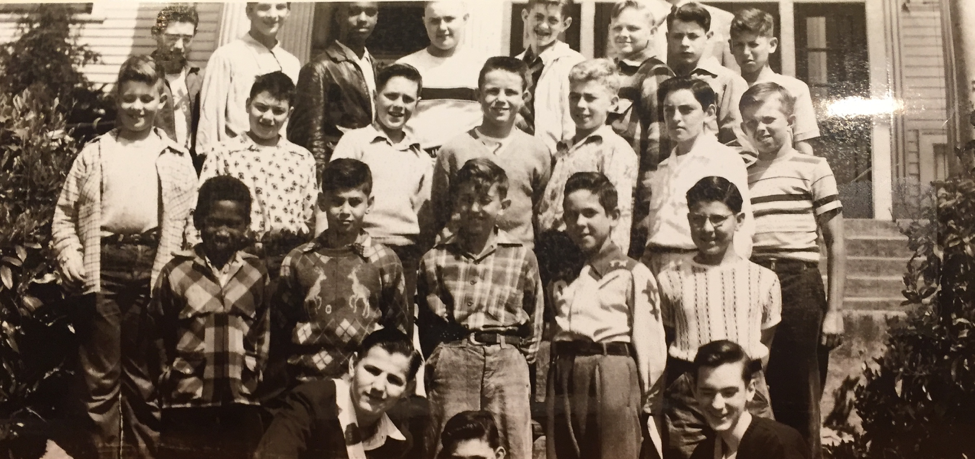
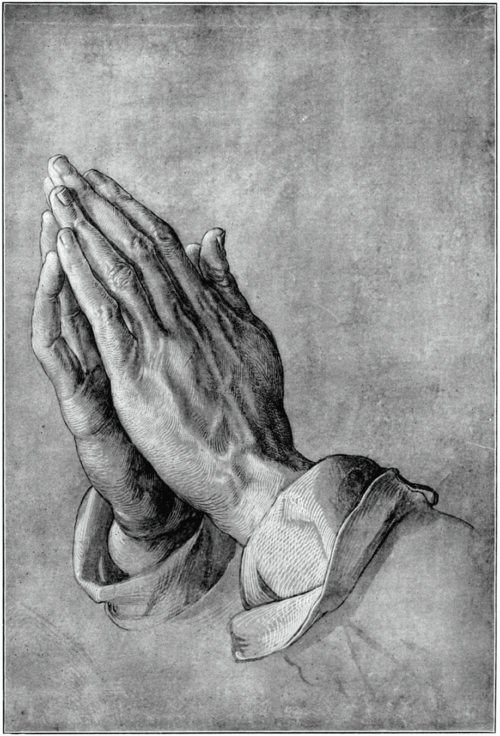
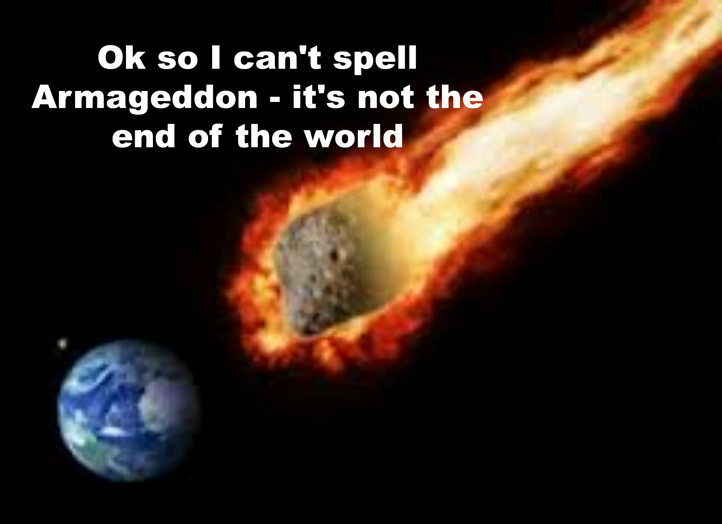
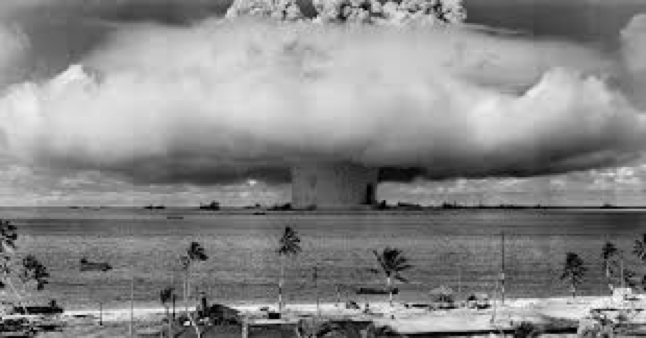
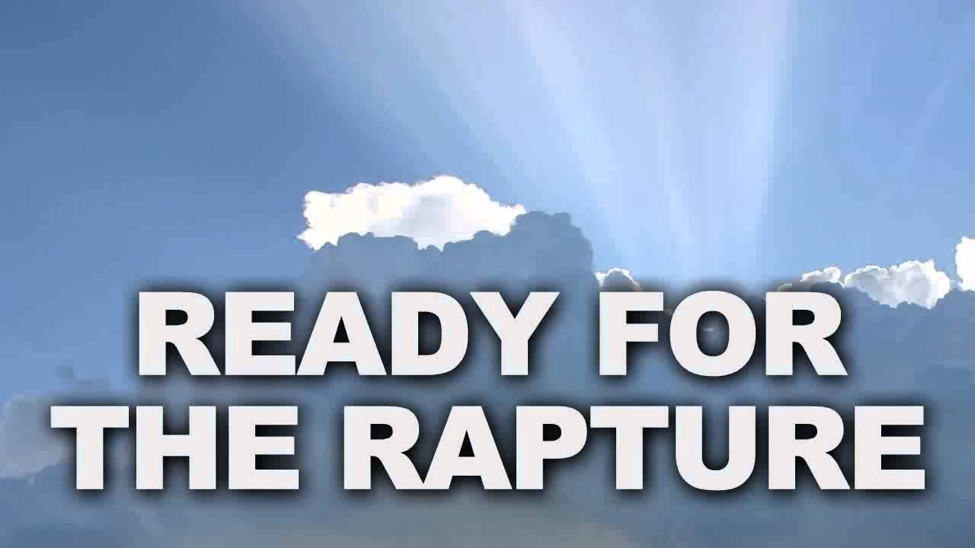
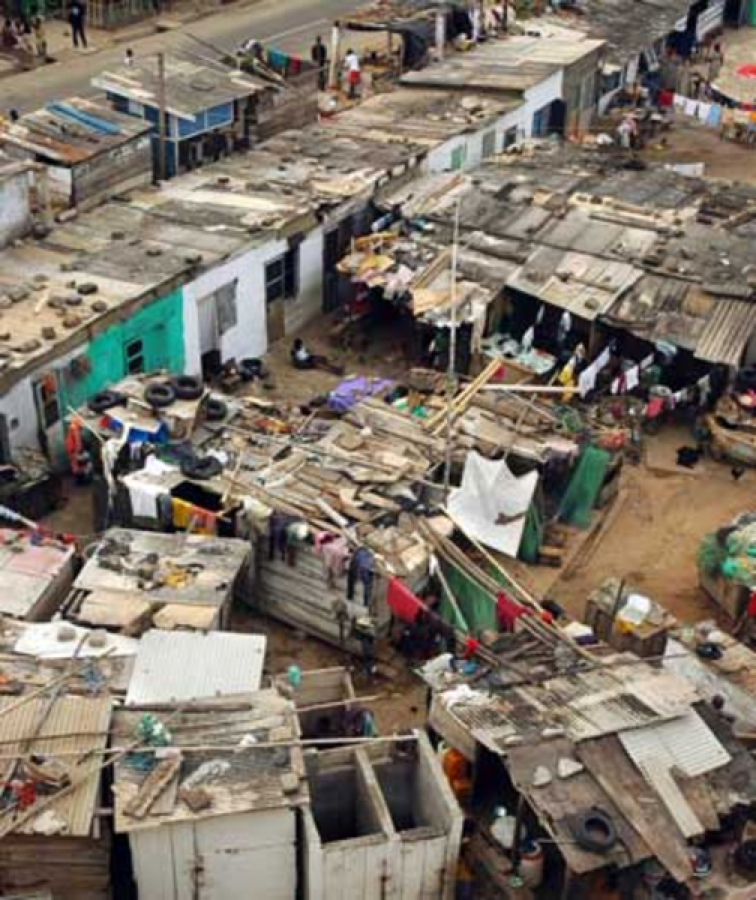
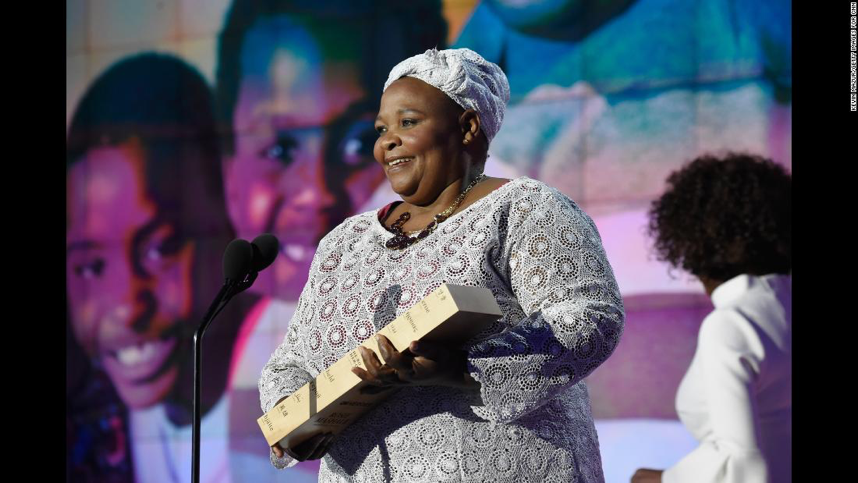
 esburg and Cape Town for work and townships, like Khayelitsha, were established to house them. Soweto, in Johannesburg, with 1.3 million residents is probably the most infamous of these slums, but Khayelitsha is the largest one in Cape Town and home to roughly 500,000. With the end of the pass laws and apartheid, women began coming to the townships, families were established, and children raised there.
esburg and Cape Town for work and townships, like Khayelitsha, were established to house them. Soweto, in Johannesburg, with 1.3 million residents is probably the most infamous of these slums, but Khayelitsha is the largest one in Cape Town and home to roughly 500,000. With the end of the pass laws and apartheid, women began coming to the townships, families were established, and children raised there.
























